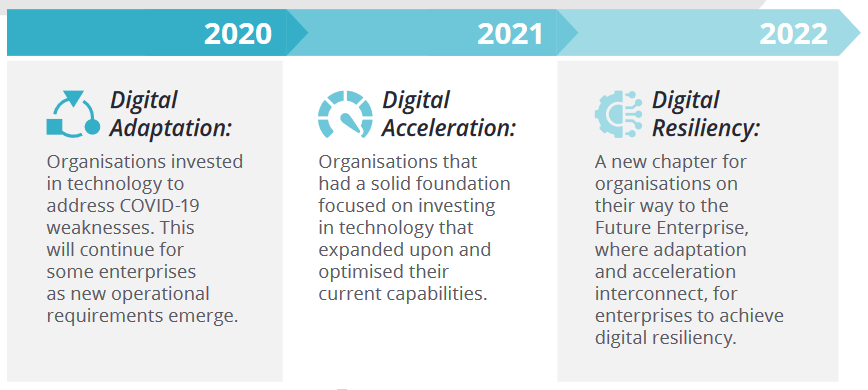|
Since 2020, digitalisation has been at the forefront of the corporate landscape, with businesses worldwide scrambling to keep up with the changes. The pandemic has only served to accelerate the process, with many SMEs, who lacked the financial and operational strength to ride out the storm, being forced to adapt and embrace technology upgrades. The need for a swift response became clear in March when the Movement Control Order (MCO) was first announced in Malaysia. This caused many businesses to completely stop or severely slow down their operations, significantly decreasing their revenue streams. Consequently, the Government announced a stimulus package launched by the Malaysia Digital Economy Corporation (MDEC), resulting in millions of citizens registering for financial aid. This resulted in Malaysian businesses to develop Digital Resiliency which was a long-awaited and necessary change within the economic system of Malaysia. What is digital resiliency? The ability for an organization to rapidly adapt to business disruptions by leveraging digital capabilities to not only restore business operations, but also capitalize on the new normal. Adaptation of different ways to digitalize within businesses such as Electronic Point of Sales (ePOS) and Digital Marketing & Sales has helped a number of SMEs to identify digital needs and solutions needed to increase their efficiency and competitiveness. Although, SMEs in Malaysia had a number of doubts that caused them to dismiss the idea of digital transformation. A joint survey by Huawei and the Malaysian government in 2018 showed that SMEs were reluctant to transform due to the lack of financing and their workers’ skills. About 50% of them listed capital as their main setback, while 60% had no idea about any relevant financing methods, while 48% of SME owners raised the fact that their employees lacked the technical skills required to go digital. The survey also highlighted that a significant number of SME owners lack technical proficiency, making it difficult for them to understand how to begin the process of digitalisation. In response to these problems raised by the people, the Malaysian government established the “100 Go Digital” campaign in order to assist businesses in digitalization, providing coaching services to help stabilize and expand businesses. This diagram shows how digital tools have helped Malaysian business across the times of the pandemic, going from Digital Adaptation to Digital Resiliency in 2022.
We at 57Network also help businesses from SMEs to larger businesses develop digital work management and a way to cut down costs through digital tools. From simple task management and project planning to complex resource and portfolio management, we can help you improve collaboration and increase work velocity, empowering you to get more done. Our platform makes it easy to plan, capture, manage, and report on work from anywhere, helping your team be more effective and get more done. Report on key metrics and get real-time visibility into work as it happens with roll-up reports, dashboards, and automated workflows built to keep your team connected and informed. When teams have clarity into the work getting done, there’s no telling how much more they can accomplish in the same amount of time. To develop a customized solution with personalized training for your team, you can contact us to integrate digital work management into your company. |
|
Care line: +603-9212 0157
|
Leave us your inquiry |
|
This company is registered with the Ministry of Finance, Malaysia.
Equip your organisation with digital solutions & training that inspire innovation and joy at work. Copyright © 2024 57Network Consultancy Sdn. Bhd. Company Registration number : 202001020346 (1376666-K) All rights reserved. |







